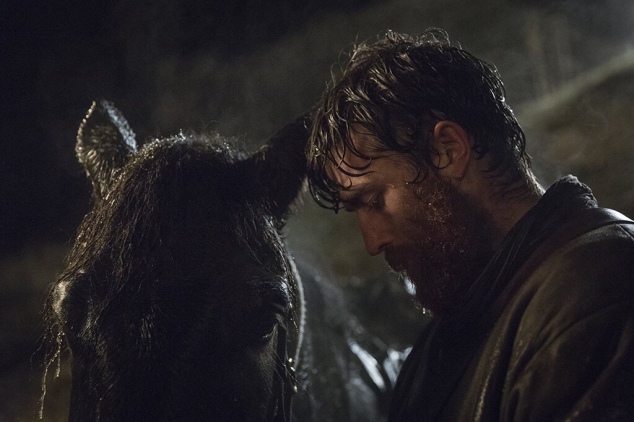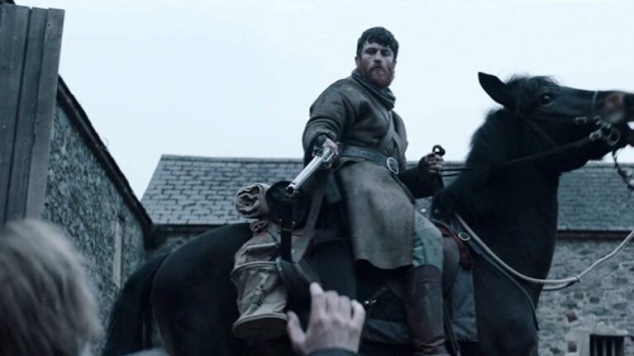
It’s been a week since I had the opportunity to see an advanced screening of the movie “Black 47” at the Omniplex Cinema in Belfast’s Kennedy Centre.

In that week the film has played on my mind.
As a stand-alone piece of cinema, it’s a wonderful revenge thriller and as has been said in any number of reviews the world over, it oozes with the strong feel of a traditional, credible and dramatic western.
I’m always immediately curious, excited and worried when films about Ireland and our history land in the pictures. We’ve been blessed with some absolute masterpieces but burdened with some terrible turkeys too.
From the minute Black 47 began trailing on internet platforms I hoped and if I’m honest, I probably sensed too, that we had the potential for a masterpiece on our hands.
At school I read “Under the Hawthorne Tree” and have memories of “The Hanging Gale”, a BBC production set during Ireland’s Great Hunger, that my parents sat us down to watch each Sunday night the series ran for. It was hard to believe, given the scale of its impact as well as its ongoing legacy on Irish life, that Black 47 would be the first time that the story of this most darkest of periods in Irish history would be brought to the big screen.
I’ve never really done film reviews on this blog before, I’m not really sure how to go about analysing the technical or indeed the totality of all the historical aspects of this particular movie; I’m reluctant to go too much into story telling about it for fear of spoilers, but that all being said, I do know what I enjoyed.
The first class acting from a diverse range of actors (some known and others less known, some Irish and some with no connections to the country at all, but all of them united in stellar, believable and deeply human performances), the credible political, social and devastating backdrop of British colonial policy in Ireland, the rugged beauty of the Irish countryside and the tense atmosphere generated by a man on a mission of vengeance for his family, his people and ultimately his country.
It also, although separate from the story, touches on the fact that even in the midst of this most desperate and terrible of times, there remained a flame of resistance to the evils of colonial occupation and the capitalist mechanics which brought a “Famine” to Ireland.

Above all, what impressed me and I believe added most to the film, was the authentic use of the Irish language.
Black 47’s characters speaking in Irish is of course natural, we are depicting the west of Ireland in the 1840’s after all.
As Irish speakers in an audience though, even when dealing with Irish cinema, we aren’t used to seeing the language given such natural prominence on the big screen; too often, for a range of reasons, directors and producers are all too willing to compromise on such a level of authenticity in order to appeal to a broader audience and generate more revenue for their work.

Black 47 puts it up to them and ultimately proves them wrong with it’s organic use of the language; Gaelic adds a greater depth to a visually and audibly luscious depiction of what is often considered the most tragic period in Irish history. From the scenery, to the dialogue, to the very clothes the characters are wearing, I don’t believe we’ve ever seen (or heard!) Irish history depicted on screen like this ever before.
*The* line of Black 47 for me is when our main protagonist tells a cruel, punitive local Judge,
“Ní hé an Bhéarla teanga na chúirte seo” – “English is not the language of this court”.
You’ll understand when you go see and you should go see.

Our history, not least in this era, is complex, at times it’s contested too; our main “hero” is a member of the Connaught Rangers having gone to Afghanistan, where he himself implemented what we are led to believe is equally violent and devastating colonial warfare and degradation against another indigenous population for the purposes of profit, dominance and military might – precisely what those who he was once fighting for are carrying out against his own people in Ireland. Our story IS complex, but what cannot be in doubt with the release of Black 47, is that it’s a history worthy of being told and told well, not just to an Irish but to a global audience too.
If you live in Ireland or Britain you should go see this movie and not wait for it to be released via online streaming platforms or lifted by RTÉ – by our deciding to go and purchase tickets we’ll help bolster this film beyond our own shores, we’ll help share it with our diaspora around the world, many of them directly descended from people forced from their homes as a result of the genocide depicted in this film. They have a stake in this story, they deserve to get seeing it in their new homeplace. They deserve an understanding and depiction of their story, of how they got to be where they are, how we Irish were once the immigrants seeking shelter, food and refuge.

Around the world, much still remains unknown about the causes and context of the Great Hunger and while this film can never tell that entire story, it’s setting and natural context and background goes some significant way in explaining a situation that many people believe they are familiar with but don’t fully understand……………..yet.
This modest Irish production can help that process and in understanding the genocide inflicted on the Irish people, this film can, in its own unique way, help create big reverberations around the world, whether intentional or not.
That’s good art.

